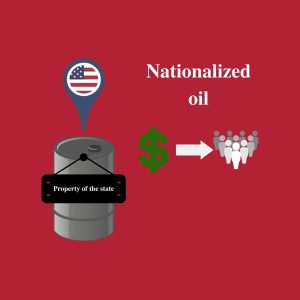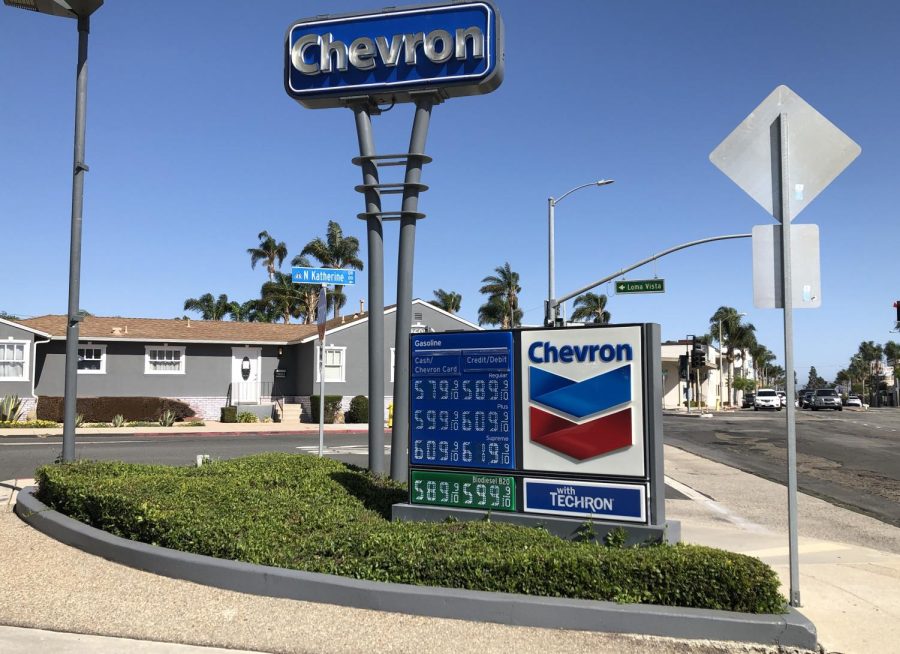Opinion: Gas prices shouldn’t be this high
On April 12 at the Chevron on East Main Street in Ventura, the price of regular fuel was $5.79 per gallon. According to the U.S. Energy Information Administration, that price is over a dollar more expensive than the average California gas price of Feb. 2022. Photo by: Alejandro Hernandez
April 19, 2022
The United States needs to nationalize its oil industry to lower gas prices and more
Gasoline. It is a commodity that is also known as gas or fuel. It has sharply risen in price, while the corporations selling it continue to reap large profits. However, it doesn’t have to be so. There is a method that could make gas prices a nonissue.
According to Accountable.US, which is a corporate watchdog organization, the energy companies of Shell, Chevron, BP and Exxon profited $75 billion during the year 2021. According to AAA, California has the highest average gas price of any U.S. state as of April 14 ($5.72 per gallon).
Senior Karely Legazpi Torres said, “Gasoline prices are very expensive and ridiculous, people need gasoline because their only means of transportation is a car and the money they earn is not enough for them, so I think it is very bad that prices have risen.”
The solution to the gas price crisis is to nationalize the American oil industry. This would mean that the U.S. government would take direct ownership of oil assets, including private property (also known as expropriation). This would likely result in a state-owned oil company that oversees national oil assets.
There is an international precedent for the nationalization of oil supplies. Mexico was the first country to nationalize its oil industry in 1938, leading to the creation of the state-owned gas company Pemex. Since then, many other states have nationalized their oil industries. Examples include Norway, Canada and Iran, among many others.
There are many justifications for a country to nationalize its oil industry. In the case of gas price increases, having energy resources within the ownership of the state allows them to cap or limit prices. This is because governments don’t have to deliver a profit to their shareholders, and they can operate at a loss. An example of this would be the state-owned rail service Amtrak, which operates at a loss due to government subsidies.
In the case that a state-owned oil company makes a profit, it can be allocated to various other government programs which ultimately improve the lives of American citizens. Its profit could be used to improve already existing infrastructure, similar to California gas taxes but on a larger scale, or it could be pumped into new infrastructure such as high-speed rail.

With great power comes great responsibility, which also holds true for expansions of government power. Petrostates like Equatorial Guinea or Saudi Arabia are dependent on their energy sectors for funds, and they don’t have to democratize either. Corrupt states can theoretically use their natural resources for the benefit of their people, but it does not happen because corrupt leaders hoard the wealth for themselves. The U.S. isn’t the most stable nation on Earth, but it is stable and uncorrupt enough to use its wealth to improve the lives of its citizens.
There are also environmental benefits to oil nationalization. If the U.S. is committed to phasing out fossil fuels, then there isn’t a reason to allow for-profit companies to continue to operate. Oil companies will try to maintain the status quo. They already have been for decades. A government that has no stake in fossil fuels should become the old resource’s caretaker, enabling its discontinuation before it emits its last CO2 emission.
The U.S. oil crisis is also a product of its lack of a proper public transportation system and its poor overall walkability. The machines that hunger for oil are the same machines that have been destroying American city planning for a near century. Cars themselves are a part of the problem, and they can be replaced with better public transportation (of course funded by state-owned oil money).
Senior Grace Morton said, “It’s possible to get the state government to do something to lower the prices, or just go electric. Driving is a necessity in California since there isn’t really public transportation and the cities aren’t really walkable. Unfortunately, I’ll just have to keep paying the high gas prices.”
The move to a nationalized oil industry in the U.S. is necessary for the sake of its national interests. It won’t only be helpful in the short term to control gas prices and their inflation, but also the total discontinuation of oil as a source of energy, paving the way for renewable sources to replace it.







![Lindsay Guzik, new assistant principal said, "I am settling in [at VHS] pretty well. I know a lot of the students, so that makes it a little bit easier coming from Cabrillo, and it's been nice to see them all grown up." Photo by: Abraham Kassa](https://thecougarpress.org/wp-content/uploads/2025/09/IMG_9728-300x200.jpg)
